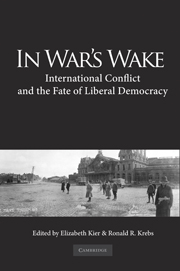Crossref Citations
This Book has been
cited by the following publications. This list is generated based on data provided by Crossref.
al-ʿAfīfī, Fatḥī
2012.
War of Creative Destruction: the central tendency in the globalized Arab revolutions (a study in the formation of the future).
Contemporary Arab Affairs,
Vol. 5,
Issue. 3,
p.
427.
Chickering, Roger
Showalter, Dennis
and
van de Ven, Hans
2012.
The Cambridge History of War.
Levy, Yagil
2013.
Convertible Sacrifice—A Conceptual Proposition.
Sociological Perspectives,
Vol. 56,
Issue. 3,
p.
439.
Gunitsky, Seva
2014.
From Shocks to Waves: Hegemonic Transitions and Democratization in the Twentieth Century.
International Organization,
Vol. 68,
Issue. 3,
p.
561.
Wimmer, Andreas
2014.
War.
Annual Review of Sociology,
Vol. 40,
Issue. 1,
p.
173.
Capoccia, Giovanni
2015.
Advances in Comparative-Historical Analysis.
p.
147.
Harada, Masataka
Ito, Gaku
and
Smith, Daniel M.
2019.
Destruction from Above: Long-Term Impacts of WWII Tokyo Air Raids.
SSRN Electronic Journal ,
Adam, Antonis
and
Karanatsis, Kostas
2019.
Sovereign Defaults and Democracy.
Comparative Economic Studies,
Vol. 61,
Issue. 1,
p.
36.
Thomson, Henry
2019.
Conflict termination, signals of state weakness and violent urban social disorder in the developing world.
Third World Thematics: A TWQ Journal,
Vol. 4,
Issue. 2-3,
p.
94.
Fennell, Jonathan
2019.
Fighting the People's War.
Johnstone, Philip
and
McLeish, Caitriona
2020.
The Role of War in Deep Transitions: Exploring Mechanisms, Imprints and Rules in Sociotechnical Systems.
SSRN Electronic Journal,
Tarrow, Sidney
2021.
Movements and Parties.
Wilson, Sven E.
and
Ruger, William
2021.
Military Service, Combat Experience, and Civic Participation.
Armed Forces & Society,
Vol. 47,
Issue. 3,
p.
551.
Crawford, Neta C.
2021.
Democracy and the Preparation and Conduct of War.
Ethics & International Affairs,
Vol. 35,
Issue. 3,
p.
353.
Blachford, Kevin
2022.
Liberal militarism and republican restraints on power: the problems of unaccountable interventions for American democracy.
Critical Military Studies,
Vol. 8,
Issue. 3,
p.
299.





